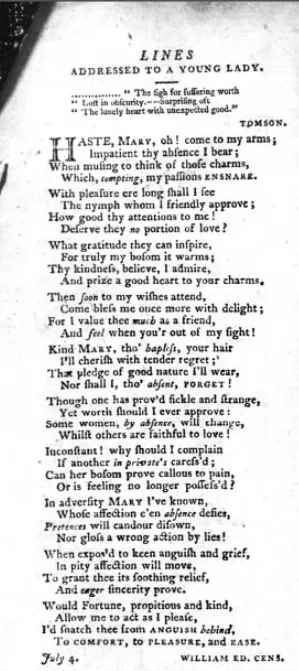With Valentine’s Day coming up, many of us are planning something special to do with our significant others, or hoping to send a valentine to someone we like.
But the 919 million old newspapers available on Newspapers.com, an online newspaper archive run by Ancestry, reveal that using personal ads and anonymous valentines to try to find love is nothing new.
Laura House, Family History Expert at Ancestry, said: “The process of finding love is always evolving, and our distant ancestors would be bewildered by today’s world of online communication and dating apps. However, though the medium has changed, there are some elements of the dating game that remain familiar. Publishing an advertisement in the Lonely Hearts column of the newspaper is not so different from writing a profile on a dating app, and bold romantic gestures like love poems are timeless.”
In the Chester Chronicle, and Cheshire and North Wales General Advertiser letters pages on 29 July 1796, someone signing himself “William Ed. Cens.” wrote a ten-verse poem to the woman he loved, beginning:
“HASTE, Mary, oh! come to my arms;
Impatient thy abfence I bear;
When mufing to think of thofe charms,
Which, tempting, my paffions ENSNARE.”
(Remember that at the time the letter f was used in place of an s.)

In the Hanwell Gazette and Brentford Observer on 14 February 1920, a “B. L. K. Henderson” wrote a similarly lovelorn poem, ending:
“Peace, lonely heart! Another heart is beating:
Within another soul there dwells a sigh:
And hope yearns deeply towards another meeting:
Another love is born which shall not die.”
On 7 April 1936, the Evening Despatch recorded a more practical approach, recording the case of a woman who wrote to Minehead Council saying: “I should be glad if you could put me in touch with a man aged about 50 or 60 who would like to correspond with me with a view to matrimony… I am 38, domesticated, affectionate, a home-lover, broadminded and also have a sense of humour. I am no gold-digger as I have means of my own. TRULY LONELY.”
Mr Etherden, chair of Minehead Council, said he was happy to “play the role of matchmaker” and anyone who wanted the woman’s address should write to the council.
On 28 July 1950, the Reveille reported a much larger-scale attempt at finding love: “Trains, coaches and planes are being chartered to bring 2000 lonely hearts from all over the world to the little Northumbrian seaside town of Whitley Bay for the most unconventional Convention ever staged. 1000 spinsters and widows and 1000 bachelors and widowers between 18 and 80 will arrive in Whitley Bay to spend a meet-and-marry weekend as delegates of a Lonely Hearts Convention.”
Interestingly, the Whitley Bay event was another example of a local council taking an interest in residents’ love lives, saying it was the brainwave of a local councillor, Douglas Kidd, who’d received a letter “from a young man who wanted a wife.”
After “700 women offered to fill the vacancy”, “between 3000 and 4000” more people “wrote to Councillor Kidd asking him to play Cupid for them too”.
With the help of the Whitley Bay Hotel and Boarding Association, Councillor Kidd organised the convention.
As the article explains, in exchange for a five shilling registration fee men would be given blue heart badges and women pink.
They would be invited to attend a meeting at the Empress Hall and given a catalogue of all those attending.
A Cameron Sim, who was arranging the convention, said: “It will save a lot of time if people look each other up in the catalogue first.”
